The Critical Need for Routine Behavioral Health Screenings
As the population of seniors in assisted living facilities continues to grow, so does the recognition of mental health as a vital component of holistic care. Routine behavioral health screenings are essential tools that enable caregivers to detect mental health issues early, promote well-being, and provide targeted interventions. Incorporating these screenings as standard practice ensures that emotional and psychological needs are addressed alongside physical health, fostering a supportive environment where seniors can maintain independence and enjoy a higher quality of life.
The Importance of Routine Behavioral Health Screenings in Assisted Living
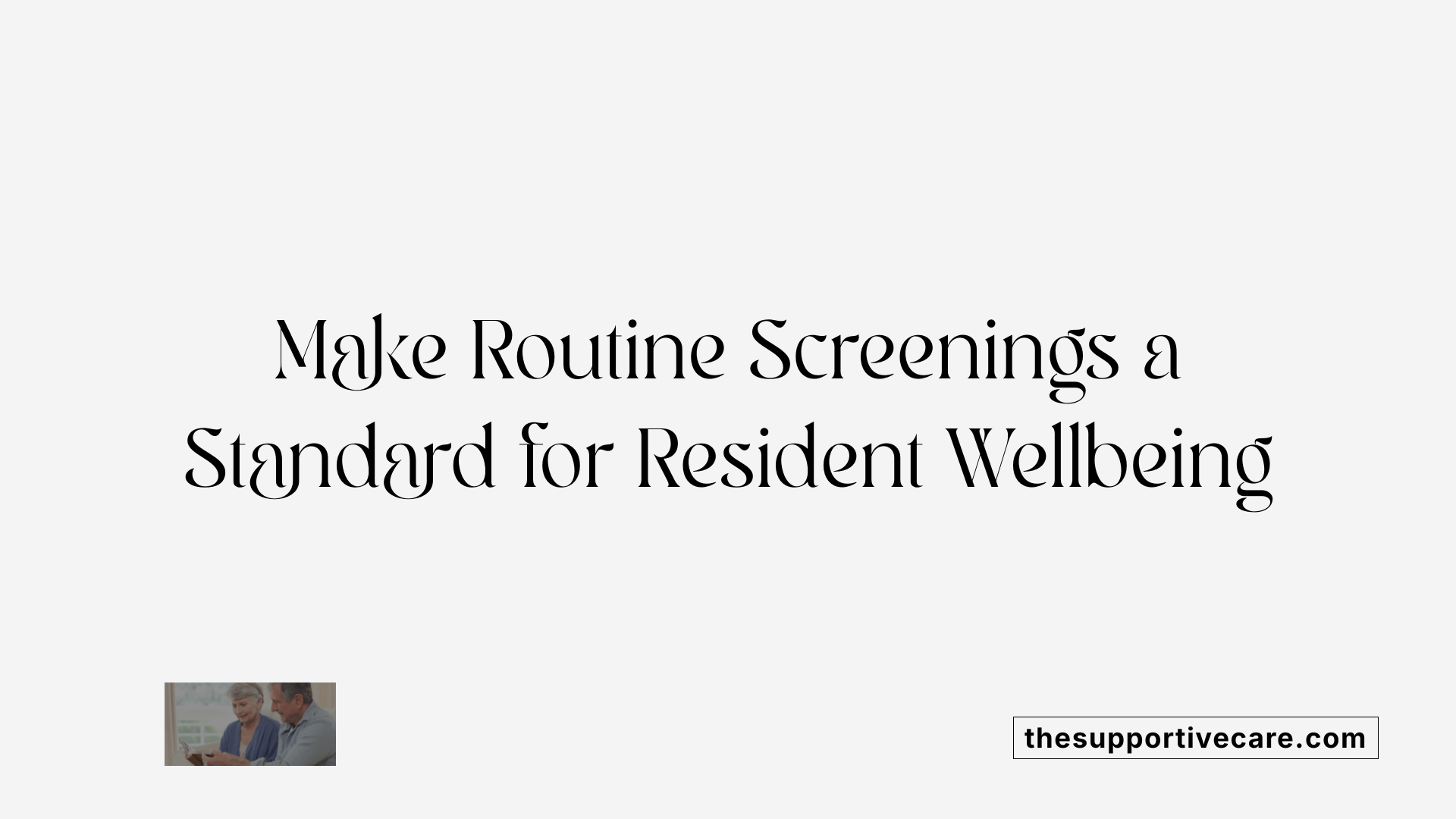
Why is integrating consistent behavioral health screenings important for assisted living facilities?
Regular mental health assessments are vital in assisted living settings to ensure early detection of issues such as depression, anxiety, and cognitive decline. Often, symptoms of these conditions can be overlooked or mistaken for normal aging, which can delay necessary treatment.
By incorporating structured screening protocols, staff can identify emotional struggles early, allowing for timely interventions that help prevent the progression of mental health problems. Early detection not only improves individual resident outcomes but also reduces overall healthcare costs by addressing issues before they escalate into crises requiring hospitalization or intensive treatment.
Routine mental health evaluations integrate seamlessly into overall health monitoring, supporting a holistic approach to senior care. They also foster an environment where mental health is normalized and prioritized, which can help diminish stigma and encourage residents to seek assistance without fear or embarrassment.
Modern digital solutions and telehealth support the accessibility and consistency of these screenings. They make it easier for staff to conduct assessments efficiently, ensuring residents receive continuous, proactive emotional support. Ultimately, integrating regular behavioral health screenings enhances the overall well-being of residents, promoting a healthier, more engaged, and more resilient community.
Benefits of Regular Behavioral Health Assessments for Elderly Residents
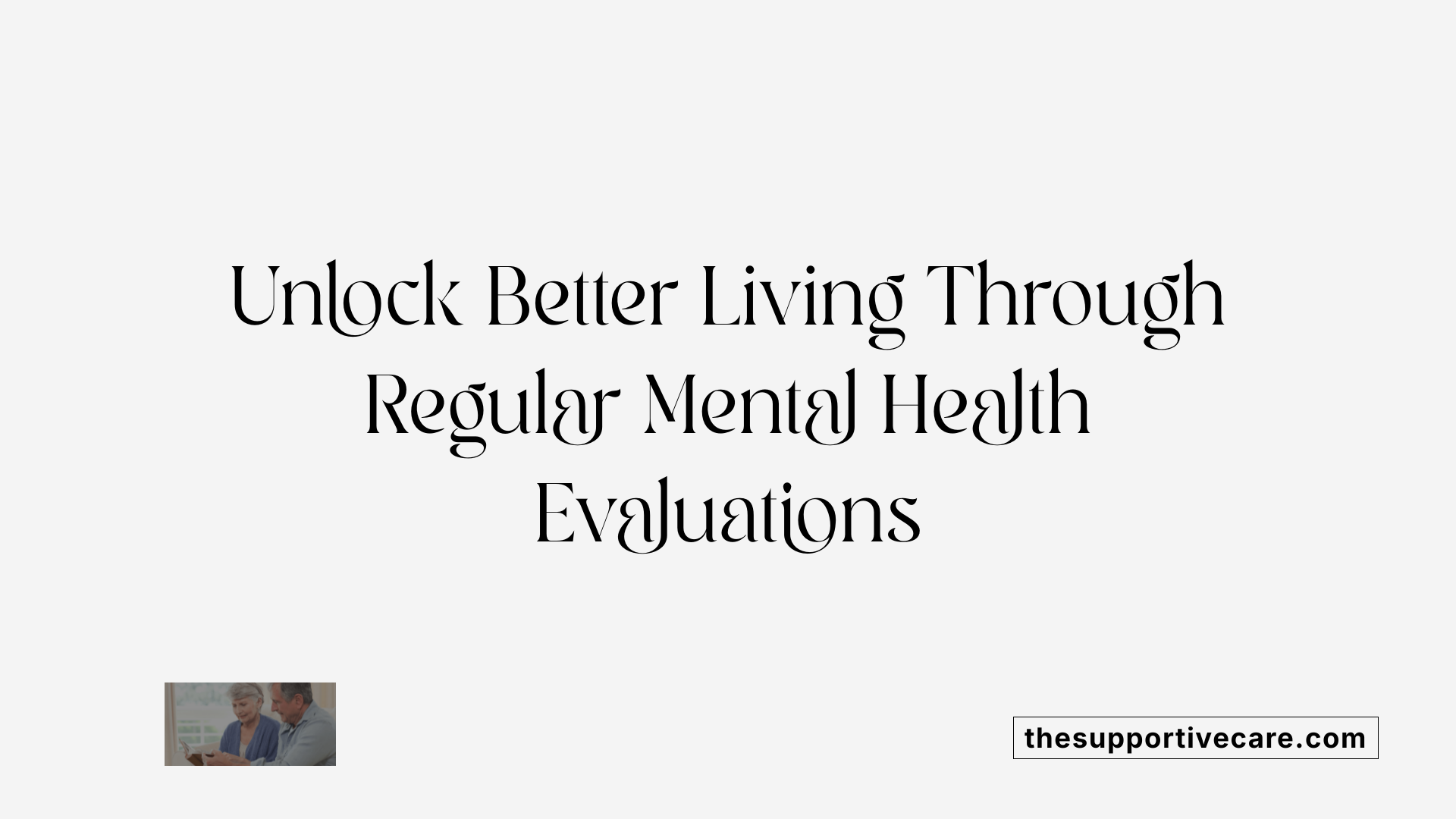
What are the benefits of regular behavioral health assessments for elderly residents?
Routine mental health evaluations play a vital role in senior care, offering numerous advantages that significantly enhance residents' well-being. One of the primary benefits is early detection of emotional, social, and cognitive issues. Conditions such as depression, anxiety, and cognitive decline—including diseases like Alzheimer’s—can often go unnoticed in older adults. Regular assessments help identify these issues promptly, enabling timely interventions that can improve or stabilize mental health.
These evaluations also support the development of personalized care plans. When healthcare providers understand a resident’s evolving mental health needs, they can tailor treatments, social activities, and therapies accordingly. This individualized approach promotes better health outcomes and helps maintain residents' independence.
Effective communication with families is another advantage. Routine assessments ensure families are kept informed about their loved one’s mental state, fostering transparency and participation in care decisions. This involvement can reduce confusion and anxiety for families while strengthening trust with care providers.
Preventing crises and hospitalizations is a crucial aspect of behavioral health assessments. By continuously monitoring mental health and social risks—such as social withdrawal or mobility issues—caregivers can mitigate potential emergencies. Early intervention not only improves safety but also decreases the likelihood of more severe health complications requiring hospitalization.
Ultimately, these assessments contribute significantly to residents’ overall quality of life. They help maintain mental agility, boost emotional resilience, and support social engagement, fostering a sense of independence. With proactive mental health monitoring, assisted living communities can ensure their residents enjoy more fulfilling, healthier lives.
| Benefit | Description | Impact on Resident Care |
|---|---|---|
| Early Detection | Identifies depression, anxiety, cognitive decline | Facilitates timely treatment |
| Personalized Plans | Customizes mental health interventions | Improves health outcomes |
| Family Communication | Keeps families informed and involved | Strengthens trust and participation |
| Crisis Prevention | Detects risks early | Reduces hospitalizations |
| Quality of Life | Enhances mental health and independence | Promotes overall well-being |
By integrating regular behavioral health assessments into daily routines, assisted living facilities and caregivers can foster safer, healthier, and more supportive environments for their elderly residents.
Why Behavioral Health Assessments Should Be a Standard Practice
Why should behavioral health assessments be a standard practice in assisted living facilities?
Residents in assisted living communities often face intricate mental health challenges that require careful attention. Conditions such as dementia, depression, anxiety, and behavioral symptoms are common and can significantly affect their quality of life. Regular behavioral health assessments serve as vital tools for early detection of these issues.
Implementing routine assessments allows healthcare providers to identify cognitive and emotional changes promptly. Early intervention can then be tailored to the individual, fostering better management of symptoms and enhancing overall well-being.
In addition to early detection, behavioral assessments inform targeted treatment plans that address specific needs. This personalized approach helps reduce the occurrence of behavioral crises, improves safety, and supports a calmer environment for residents.
Preventing unnecessary hospitalizations is another benefit. When behavioral and mental health concerns are addressed proactively, it lessens the likelihood of emergency situations that often lead to hospital stays. This not only improves the quality of life for residents but also reduces healthcare costs.
Standardized mental health evaluations are crucial because they fill gaps in the current mental health services available in assisted living settings. Many residents do not receive sufficient attention for mental health conditions due to limited resources or recognition.
By integrating behavioral health assessments regularly, assisted living facilities can provide more comprehensive, person-centered care. This approach ensures that each resident’s unique needs are acknowledged and addressed continuously.
In summary, routine mental health screenings in assisted living settings are essential for early detection, personalized interventions, crisis reduction, and overall better health outcomes. They enable staff to deliver tailored, compassionate care that truly supports residents’ mental and emotional well-being.
| Benefit | Description | Impact |
|---|---|---|
| Early Detection | Identifies cognitive and emotional decline at initial stages | Increases chances for effective management |
| Personalized Care | Customizes interventions based on assessments | Enhances individual quality of life |
| Crisis Prevention | Reduces behavioral episodes | Creates safer environments |
| Hospitalization Reduction | Prevents unnecessary emergency admissions | Lowers healthcare costs |
| Continual Support | Provides ongoing mental health monitoring | Ensures adaptive care plans |
Keeping mental health screening as a standard part of care routines, supported by staff training and collaboration with mental health professionals, is an investment in the overall safety, health, and happiness of residents.
The Significance of Mental Health Screening in Senior Care Settings
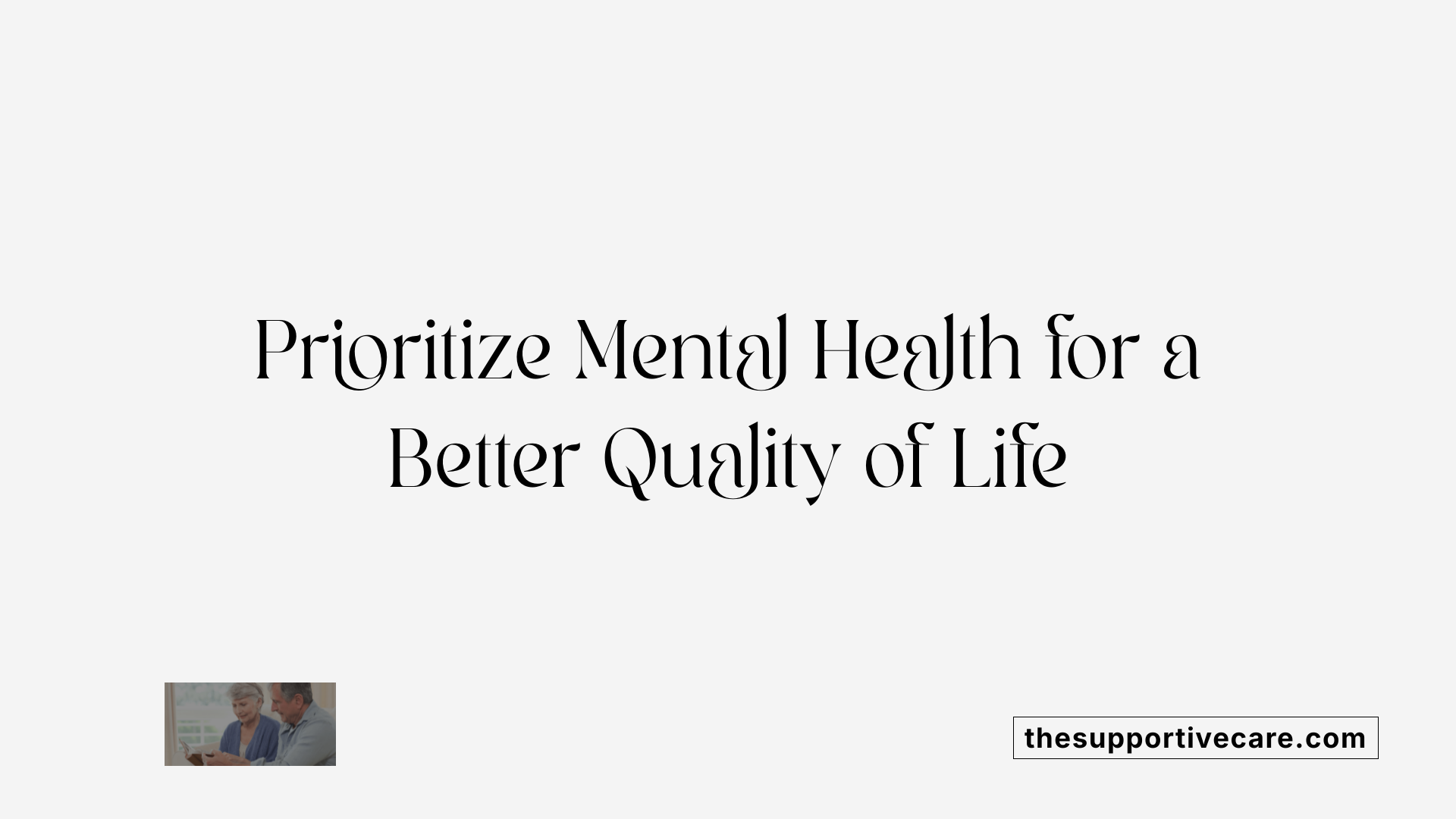
Why is routine mental health screening important for seniors?
Regular assessments for mental health issues, like depression and anxiety, are vital in senior care environments. These screenings help identify conditions that are often underdiagnosed or dismissed as normal parts of aging. Many older adults do not openly share their emotional struggles, making proactive screening essential for early detection.
How are validated tools used for screening?
Healthcare providers use specific, research-backed questionnaires to identify mental health concerns efficiently. The Geriatric Depression Scale-15 (GDS-15) is a popular example, designed to quickly assess depressive symptoms in older adults. Such validated tools improve detection accuracy and allow practitioners to monitor mental health over time.
Addressing underdiagnosis and health disparities
Studies show that depression often remains missed in older populations, especially among minority and socially isolated groups. Systematic screening reduces these disparities by ensuring everyone receives mental health evaluations, regardless of background. This approach promotes equitable access to necessary treatments.
Interventions following screening results
When screenings indicate mental health concerns, interventions like counseling, medication, or community-based programs can be initiated promptly. Early treatment can prevent complications such as cognitive decline, physical health deterioration, and social withdrawal.
Ongoing evaluation and support
Regular mental health assessments facilitate continuous monitoring, allowing care plans to adapt to changing conditions. This proactive approach ensures sustained support, enhances quality of life, and maintains seniors’ independence.
| Aspect | Description | Additional Details |
|---|---|---|
| Screening tools | Validated questionnaires like GDS-15, PHQ-9, and GAD-7 | Short, sensitive, specific |
| Target conditions | Depression, anxiety, cognitive impairments | Early detection crucial |
| Intervention options | Counseling, medication, social programs | Customized based on needs |
| Importance | Reduces underdiagnosis, improves outcomes | Bridging care gaps |
Implementing routine mental health screening in senior care settings ensures that emotional and cognitive well-being receive the attention they deserve. This, in turn, enhances overall health, reduces hospitalizations, and supports a more holistic approach to aging gracefully.
Implementing Effective Behavioral Health Screening Strategies
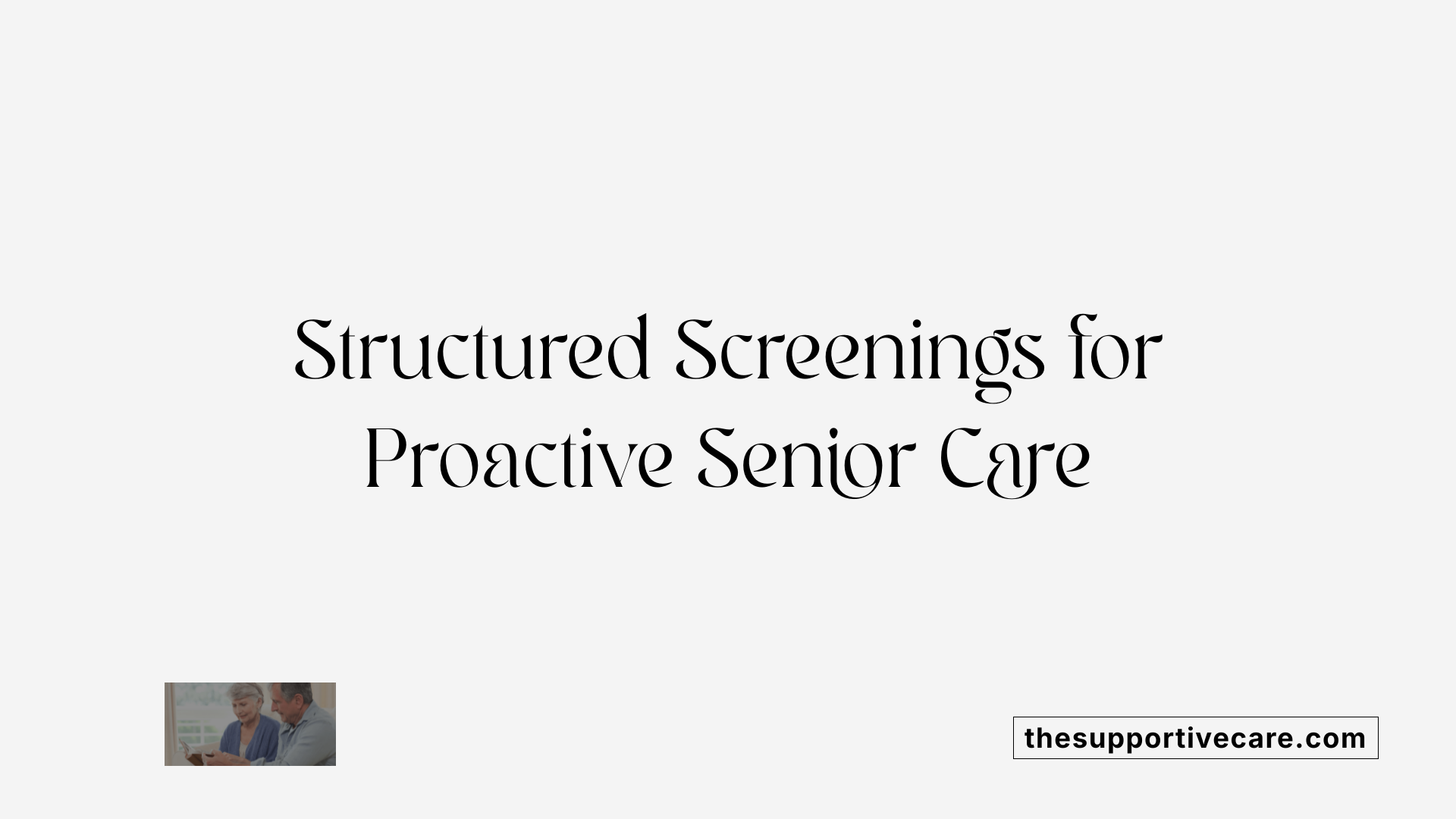
Why is mental health screening important in assisted living facilities?
Mental health screening plays a vital role in assisted living settings because it enables early identification of issues like depression, anxiety, and cognitive impairments. Early detection can lead to timely treatment interventions, preventing conditions from worsening and reducing the risk of hospitalizations. Conducting routine mental health assessments improves residents’ overall well-being, functioning, and social engagement, which are crucial for a thriving senior community.
Regular screenings also facilitate conversations about mental health, helping to normalize these discussions and diminish stigma. Furthermore, with advancements in technology and online platforms, screening processes can be more accessible and less intimidating for residents. These tools ensure that mental health support becomes an integral, routine aspect of comprehensive senior care.
Use of validated tools (PHQ-9, GAD-7 etc.)
Effective mental health screening relies on proven assessment instruments such as the Patient Health Questionnaire (PHQ-9) for depression and the Generalized Anxiety Disorder scale (GAD-7). Ultra-short tools like PHQ-2 and GAD-2 are useful for quick initial assessments, offering high sensitivity and specificity.
For substance use screening, tools such as AUDIT-C and CAGE are recommended. These instruments help identify residents who might require detailed evaluations or intervention.
Selecting appropriate tools depends on the conditions being assessed, the resident population’s characteristics, and resource availability. Combining multiple single-disorder screener tools or opting for multi-disorder instruments can enhance detection accuracy.
Creating structured screening protocols
Implementing a clear, step-by-step screening process is essential. Protocols should specify when and how screenings are conducted, who administers them, and how results are documented.
Structured protocols ensure consistency, reduce missed assessments, and facilitate timely follow-up actions. Routine screenings might be scheduled quarterly, biannually, or annually, based on residents’ needs.
Protocols should also incorporate a pathway for immediate intervention if screenings detect urgent mental health concerns, such as suicidal ideation or severe depression.
Staff training and education
Training staff on how to conduct mental health screenings and interpret results is vital. Proper education ensures assessments are conducted accurately and empathetically.
Caregivers should understand the purpose of screenings, how to address residents’ questions, and how to handle sensitive disclosures.
Ongoing education keeps staff updated on new tools, best practices, and emerging mental health issues affecting seniors.
Follow-up diagnosis and treatment plans
Screening is only the first step. Positive results must lead to comprehensive diagnoses by mental health professionals.
Developing individualized treatment plans, including therapy, medication, or social interventions, can significantly improve residents’ quality of life.
Regular monitoring allows for the adjustment of treatment strategies, ensuring personalized and effective care.
Incorporating telehealth support
Telehealth has become a valuable component in senior mental health care, especially in maintaining access to specialists.
Virtual consultations help residents receive timely evaluations and ongoing support without the need for travel.
Telehealth can also augment staff capacity, providing immediate professional guidance when a screening indicates mental health concerns.
By integrating these strategies—validated tools, structured protocols, staff training, follow-up plans, and telehealth support—assisted living facilities can create a comprehensive framework to support the mental health of their residents effectively.
Holistic Approaches Enhancing Mental and Physical Health
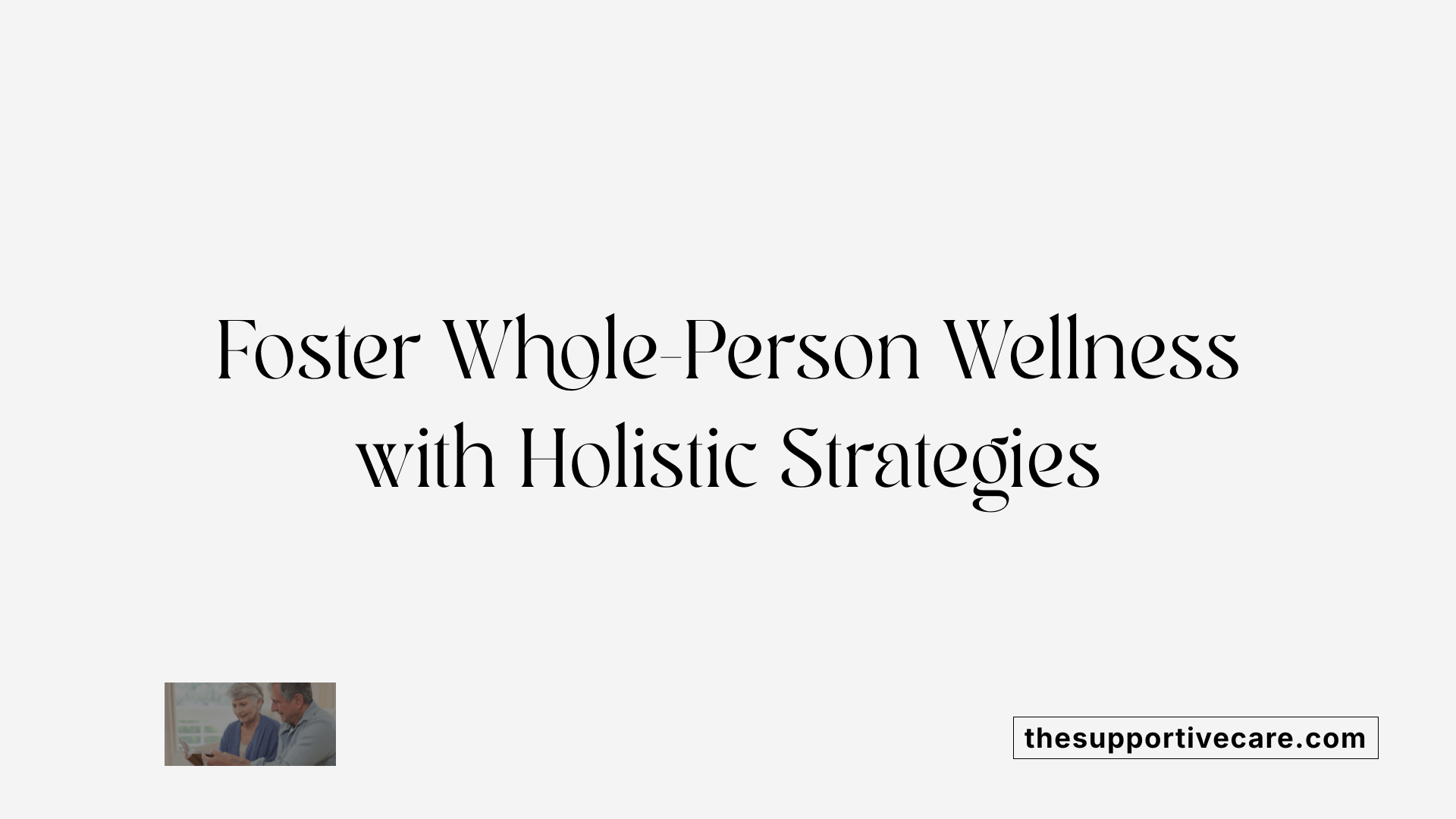
Nutritional Assessments
Nutritional health is a fundamental aspect of senior well-being, and regular assessments help identify deficiencies or dietary issues that could affect overall health. These evaluations ensure seniors receive personalized dietary guidance, supporting their immune system, bone strength, and mental clarity.
Physical Activity Evaluation
Incorporating physical activity evaluations into regular screenings enables caregivers to tailor exercise programs suited to each resident's mobility and health status. Promoting appropriate physical activity helps improve cardiovascular health, flexibility, and mental alertness, reducing the risk of conditions like osteoporosis and arthritis.
Use of Technology in Screenings
Advancements in technology play a vital role in making health screenings more accurate and efficient. Wearable devices can monitor vital signs in real-time, while AI-driven tools assist in early detection of changes in health indicators. Telehealth services further extend access to healthcare providers, ensuring ongoing support.
Creating a Comfortable Environment During Assessments
The setting of health screenings significantly influences a senior's comfort and cooperation. Facilities prioritize creating a welcoming, stress-free atmosphere with warm lighting and friendly staff. This approach builds trust, making residents more willing to participate actively and share pertinent health information.
Community Engagement Activities
Engagement in social activities and community programs is essential for mental wellness. Activities like hobby groups, music, arts and crafts, pet therapy, and gardening help reduce loneliness and foster social connections. These activities are often integrated with health screenings, contributing to holistic care that nurtures both body and mind.
| Aspect | Importance | Techniques or Examples |
|---|---|---|
| Nutritional assessments | Maintains immune health, supports cognitive function | Dietary reviews, nutritional counseling |
| Physical activity evaluation | Enhances mobility, prevents muscle decline | Personalized exercise plans, mobility assessments |
| Use of technology | Improves detection accuracy, remote monitoring | Wearables, AI analysis, telehealth consultations |
| Comfortable environment | Reduces stress, encourages honest communication | Friendly staff, calming setting, privacy considerations |
| Community engagement | Supports mental health, reduces loneliness | Social clubs, hobby groups, therapy sessions |
Through these holistic strategies, senior care providers, like Westmont of La Mesa, aim to improve health outcomes and foster a supportive environment that addresses both physical and mental needs, promoting a higher quality of life for residents.
The Path Forward for Senior Mental Health Care
Integrating routine behavioral health screenings within assisted living facilities is a vital step toward comprehensive, person-centered care. These practices enable early detection and intervention, better resource allocation, and foster an environment where mental health is prioritized equally with physical health. As assisted living communities continue to evolve, embracing innovative techniques, technology, and holistic approaches will be key to ensuring residents’ emotional well-being, independence, and overall quality of life. By making mental health screenings routine, facilities can build healthier, more supportive environments that respect and respond to the complex needs of their residents, truly supporting their journey to well-being.
References
- The Importance of Regular Health Screenings in Assisted Living ...
- The Benefits of Ongoing Mental Health Assessments in Assisted ...
- Screening for Behavioral Health Conditions in Primary Care Settings
- More Than a Mood: Why Depression Screening Should Be Routine
- Wellness Checks and Routine Health Monitoring in Senior Living
- How Assisted Living Communities Support Mental Health for Seniors
- Essential Health Screenings for Older Adults - Juniper Communities
- Recommendations for Medical and Mental Health Care in Assisted ...
- The Challenge of Integrating Behavioral Health Care in Assisted ...
- Quality of Mental Health Care for Nursing Home Residents



































































































